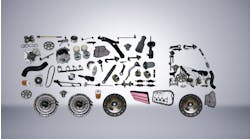The Federal Motor Carrier Safety Administration (FMCSA) has extended its emergency exemption for truck and bus drivers assisting with COVID-19 pandemic relief efforts by another five weeks through May 15.
The exemption, first issued on March 13, was set to expire on April 12. In its April 8 announcement, FMCSA expanded the list of products and services eligible for the exemption to include transportation of liquified petroleum gases to be used in refrigeration or cooling systems.
Under the emergency declaration, motor carriers and drivers providing direct assistance in support of relief efforts related to the COVID-19 outbreak are not required to comply with Parts 390 through 399 of the Federal Motor Carrier Safety Regulations (FMCSR) — including rules covering hours of service, vehicle inspections, and driver qualification, among others.
FMCSA’s expanded declaration provides for regulatory relief for commercial motor vehicle operations providing direct assistance supporting emergency relief efforts intended to meet immediate needs for:
- Medical supplies and equipment related to the testing, diagnosis and treatment of COVID-19
- Supplies and equipment necessary for community safety, sanitation, and prevention of community transmission of COVID-19 such as masks, gloves, hand sanitizer, soap and disinfectants
- Food, paper products and other groceries for emergency restocking of distribution centers or stores
- Immediate precursor raw materials — such as paper, plastic or alcohol—that are required and to be used for the manufacture of essential items
- Fuel
- Liquified gases to be used in refrigeration or cooling systems
- Equipment, supplies and persons needed to establish and manage temporary housing or quarantines
- Persons designated by federal, state or local authorities for medical, isolation, or quarantine purposes
- Persons necessary to provide other medical or emergency services
Direct assistance does not include routine commercial deliveries, including mixed loads with a nominal quantity of qualifying emergency relief added to obtain the benefits of this emergency declaration.
Commercial carriers and drivers providing direct assistance to the nationwide emergency are not granted emergency relief from, and must continue to comply with, the following FMCSR conditions:
- Those related to the operation of a commercial motor vehicle, including compliance with applicable speed limits and other traffic restrictions.
- Those related to operation of a commercial motor vehicle while a driver's ability or alertness is so impaired, or so likely to become impaired, through fatigue, illness, or any other cause, as to make it unsafe for him/her to begin or continue to operate the vehicle.
- Carriers cannot require or allow fatigued drivers to operate a commercial motor vehicle. A driver who informs a carrier that he/she needs immediate rest shall be given at least 10 consecutive hours before the driver is required to return to service.
- A carrier whose driver is involved in a crash while operating under this emergency declaration must report any recordable crash within 24 hours, by phone or in writing, to the FMCSA Division Office where the carrier is located. The carrier must report the date, time, location, driver, vehicle identification, and brief description of the crash.
- Drivers and carriers operating under this exemption must continue to comply with the commercial driver’s license, drug and alcohol testing, financial responsibility (insurance), hazardous materials, and size and weight requirements.
- Carriers or drivers currently subject to an out-of-service order are not eligible for relief until they have met the applicable conditions and the order has been rescinded by FMCSA in writing.
The exemption will remain in place through May 15, 2020, or until the national emergency is terminated.



